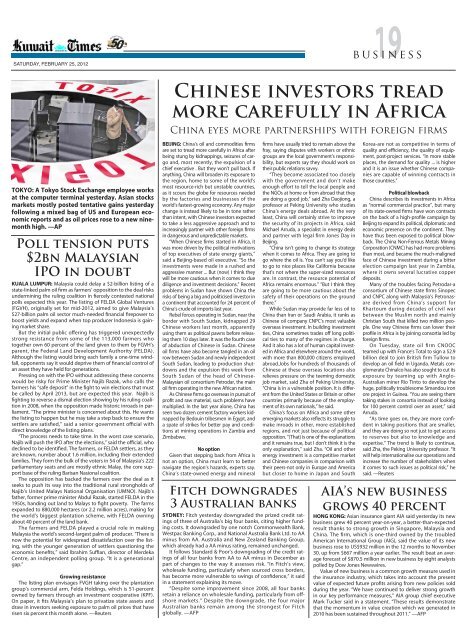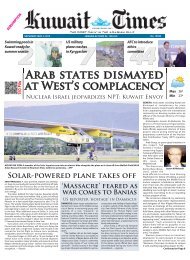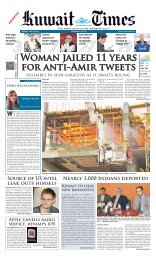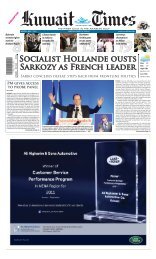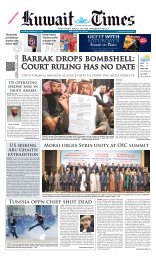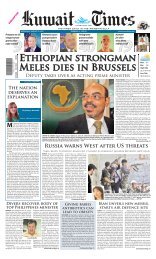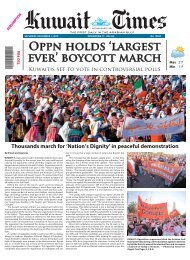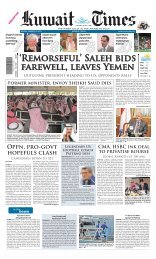Download - Kuwait Times
Download - Kuwait Times
Download - Kuwait Times
You also want an ePaper? Increase the reach of your titles
YUMPU automatically turns print PDFs into web optimized ePapers that Google loves.
SATURDAY, FEBRUARY 25, 2012<br />
TOKYO: A Tokyo Stock Exchange employee works<br />
at the computer terminal yesterday. Asian stocks<br />
markets mostly posted tentative gains yesterday<br />
following a mixed bag of US and European economic<br />
reports and as oil prices rose to a new ninemonth<br />
high. —AP<br />
Poll tension puts<br />
$2bn Malaysian<br />
IPO in doubt<br />
KUALA LUMPUR: Malaysia could delay a $2-billion listing of a<br />
state-linked palm oil firm as farmers’ opposition to the deal risks<br />
undermining the ruling coalition in fiercely contested national<br />
polls expected this year. The listing of FELDA Global Ventures<br />
(FGVH), originally set for mid-2012, aimed to give Malaysia’s<br />
$27-billion palm oil sector much-needed financial firepower to<br />
boost yields and expand when top producer Indonesia is gaining<br />
market share.<br />
But the initial public offering has triggered unexpectedly<br />
strong resistance from some of the 113,000 farmers who<br />
together own 60 percent of the land given to them by FGVH’s<br />
parent, the Federal Land Development Authority (FELDA).<br />
Although the listing would bring each family a one-time windfall,<br />
opponents say it would deprive them of financial control of<br />
an asset they have held for generations.<br />
Pressing on with the IPO without addressing these concerns<br />
would be risky for Prime Minister Najib Razak, who calls the<br />
farmers his “safe deposit” in the fight to win elections that must<br />
be called by April 2013, but are expected this year. Najib is<br />
fighting to reverse a dismal election showing by his ruling coalition<br />
in 2008, when the opposition made historic inroads in parliament.<br />
“The prime minister is concerned about this. He wants<br />
the listing to happen but he may take a step back to ensure the<br />
settlers are satisfied,” said a senior government official with<br />
direct knowledge of the listing plans.<br />
“The process needs to take time. In the worst case scenario,<br />
Najib will push the IPO after the elections,” said the official, who<br />
declined to be identified. The farmers, or FELDA settlers, as they<br />
are known, number about 1.6 million, including their extended<br />
families. They form the bulk of the voters in 54 of Malaysia’s 222<br />
parliamentary seats and are mostly ethnic Malay, the core support<br />
base of the ruling Barisan Nasional coalition.<br />
The opposition has backed the farmers over the deal as it<br />
seeks to push its way into the traditional rural strongholds of<br />
Najib’s United Malays National Organisation (UMNO). Najib’s<br />
father, former prime minister Abdul Razak, started FELDA in the<br />
1950s, handing out land to Malays to fight poverty. The farms<br />
expanded to 880,000 hectares (or 2.2 million acres), making for<br />
the world’s biggest plantation scheme, with FELDA owning<br />
about 40 percent of the land bank.<br />
The farmers and FELDA played a crucial role in making<br />
Malaysia the world’s second-largest palm oil producer. “There is<br />
now the potential for widespread dissatisfaction over the listing,<br />
with the younger generation of settlers questioning the<br />
economic benefits,” said Ibrahim Suffian, director of Merdeka<br />
Centre, an independent polling group. “It is a generational<br />
gap.”<br />
Growing resistance<br />
The listing plan envisages FVGH taking over the plantation<br />
group’s commercial arm, Felda Holdings, which is 51-percent<br />
owned by farmers through an investment cooperative (KPF).<br />
On paper, it fits Malaysia’s plan to privatize state assets and<br />
draw in investors seeking exposure to palm oil prices that have<br />
risen six percent this month alone. —Reuters<br />
business<br />
Chinese investors tread<br />
more carefully in Africa<br />
China eyes more partnerships with foreign firms<br />
BEIJING: China’s oil and commodities firms<br />
are set to tread more carefully in Africa after<br />
being stung by kidnappings, seizures of cargo<br />
and, most recently, the expulsion of a<br />
chief executive . But they won’t pull back. If<br />
anything, China will broaden its exposure to<br />
the region, home to some of the world’s<br />
most resource-rich but unstable countries,<br />
as it scours the globe for resources needed<br />
by the factories and businesses of the<br />
world’s fastest-growing economy. Any major<br />
change is instead likely to be in tone rather<br />
than intent, with Chinese investors expected<br />
to take a less aggressive approach and to<br />
increasingly partner with other foreign firms<br />
in dangerous and unpredictable markets.<br />
“When Chinese firms started in Africa, it<br />
was more driven by the political motivations<br />
of top executives of state energy giants,”<br />
said a Beijing-based oil executive. “So the<br />
investments were made in a rushed and<br />
aggressive manner ... But (now) I think they<br />
will be more cautious when it comes to due<br />
diligence and investment decisions.” Recent<br />
problems in Sudan have shown China the<br />
risks of being a big and politicised investor in<br />
a continent that accounted for 24 percent of<br />
China’s crude oil imports last year.<br />
Rebel forces operating in Sudan, near the<br />
border with South Sudan, kidnapped 29<br />
Chinese workers last month, apparently<br />
using them as political pawns before releasing<br />
them 10 days later. It was the fourth case<br />
of abduction of Chinese in Sudan. Chinese<br />
oil firms have also become tangled in an oil<br />
row between Sudan and newly independent<br />
South Sudan, leading to production shutdowns<br />
and the expulsion this week from<br />
South Sudan of the head of Chinese-<br />
Malaysian oil consortium Petrodar, the main<br />
oil firm operating in the new African nation.<br />
As Chinese firms go overseas in pursuit of<br />
profit and raw material, such problems have<br />
multiplied. In the last year alone, China has<br />
seen two dozen cement factory workers kidnapped<br />
by Bedouin tribesmen in Egypt, and<br />
a spate of strikes for better pay and conditions<br />
at mining operations in Zambia and<br />
Zimbabwe.<br />
No option<br />
Given that stepping back from Africa is<br />
not an option, China must learn to better<br />
navigate the region’s hazards, experts say.<br />
China’s state-owned energy and mineral<br />
Fitch downgrades<br />
3 Australian banks<br />
SYDNEY: Fitch yesterday downgraded the prized credit ratings<br />
of three of Australia’s big four banks, citing higher funding<br />
costs. It downgraded by one notch Commonwealth Bank,<br />
Westpac Banking Corp., and National Australia Bank Ltd. to AA<br />
minus from AA. Australia and New Zealand Banking Group,<br />
which already had a AA minus rating, remained unchanged.<br />
It follows Standard & Poor’s downgrading of the credit ratings<br />
of all four banks from AA to AA minus in December as<br />
part of changes to the way it assesses risk. “In Fitch’s view,<br />
wholesale funding, particularly when sourced cross borders,<br />
has become more vulnerable to swings of confidence,” it said<br />
in a statement explaining its move.<br />
“Despite some improvement since 2008, all four banks<br />
retain a reliance on wholesale funding, particularly from offshore<br />
markets.” Despite the downgrade, the four major<br />
Australian banks remain among the strongest for Fitch<br />
globally. —AFP<br />
firms have usually tried to remain above the<br />
fray, saying disputes with workers or ethnic<br />
groups are the local government’s responsibility,<br />
but experts say they should work on<br />
their public relations savvy.<br />
“They become associated too closely<br />
with the government and don’t make<br />
enough effort to tell the local people and<br />
the NGOs at home or from abroad that they<br />
are doing a good job,” said Zha Daojiong, a<br />
professor at Peking University who studies<br />
China’s energy deals abroad. At the very<br />
least, China will certainly strive to improve<br />
the security of its projects in Africa, said<br />
Michael Arruda, a specialist in energy deals<br />
and partner with legal firm Jones Day in<br />
Beijing.<br />
“China isn’t going to change its strategy<br />
when it comes to Africa. They are going to<br />
go where the oil is. You can’t say you’d like<br />
to go to nice places like California because<br />
that’s not where the super-sized resources<br />
are. In contrast, the resource potential of<br />
Africa remains enormous.” “But I think they<br />
are going to be more cautious about the<br />
safety of their operations on the ground<br />
there.”<br />
While Sudan may provide far less oil to<br />
China than Iran or Saudi Arabia, it ranks as<br />
Chinese oil company CNPC’s most valuable<br />
overseas investment. In building investment<br />
ties, China sometimes trades off long political<br />
ties to many of the regimes in charge.<br />
And it also has a lot of human capital invested<br />
in Africa and elsewhere around the world,<br />
with more than 800,000 citizens employed<br />
abroad.Jobs for hundreds of thousands of<br />
Chinese at these overseas locations also<br />
relieves pressure on the teeming domestic<br />
job market, said Zha of Peking University.<br />
“China is in a vulnerable position. It is different<br />
from the United States or Britain or other<br />
countries primarily because of the employment<br />
of its own nationals,” he said.<br />
China’s focus on Africa and some other<br />
emerging markets also reflects its struggle to<br />
make inroads in other, more established<br />
regions, and not just because of political<br />
opposition. “(That) is one of the explanations<br />
and it remains true, but I don’t think it is the<br />
only explanation,” said Zha. “Oil and other<br />
energy investment is a competitive market<br />
and Chinese companies in comparison with<br />
their peers-not only in Europe and America<br />
but closer to home in Japan and South<br />
Korea-are not as competitive in terms of<br />
quality and efficiency, the quality of equipment,<br />
post-project services. “In more stable<br />
places, the demand for quality ... is higher<br />
and it is an issue whether Chinese companies<br />
are capable of winning contracts in<br />
those countries.”<br />
Political blowback<br />
China describes its investments in Africa<br />
as “normal commercial practice”, but many<br />
of its state-owned firms have won contracts<br />
on the back of a high-profile campaign by<br />
Beijing to expand its political, diplomatic and<br />
economic presence on the continent. They<br />
have thus been exposed to political blowback.<br />
The China Non-Ferrous Metals Mining<br />
Corporation (CNMC) has had more problems<br />
than most, and became the much-maligned<br />
face of Chinese investment during a bitter<br />
election campaign last year in Zambia,<br />
where it owns several lucrative copper<br />
deposits.<br />
Many of the troubles facing Petrodar-a<br />
consortium of Chinese state firms Sinopec<br />
and CNPC along with Malaysia’s Petronasare<br />
derived from China’s support for<br />
Khartoum during decades of civil war<br />
between the Muslim north and mainly<br />
Christian South that killed two million people.<br />
One way Chinese firms can lower their<br />
profile in Africa is by joining consortia led by<br />
foreign firms.<br />
On Tuesday, state oil firm CNOOC<br />
teamed up with France’s Total to sign a $2.9<br />
billion deal to join British firm Tullow to<br />
develop an oil field in Uganda. Metals conglomerate<br />
Chinalco has also sought to cut its<br />
exposure by teaming up with Anglo-<br />
Australian miner Rio Tinto to develop the<br />
huge, politically troublesome Simandou iron<br />
ore project in Guinea. “You are seeing them<br />
taking stakes in consortia instead of looking<br />
for 100 percent control over an asset,” said<br />
Arruda.<br />
“As time goes on, they are more confident<br />
in taking positions that are smaller,<br />
and they are doing so not just to get access<br />
to reserves but also to knowledge and<br />
expertise.” The trend is likely to continue,<br />
said Zha, the Peking University professor. “It<br />
will help internationalise our operations and<br />
increase the number of stakeholders when<br />
it comes to such issues as political risk,” he<br />
said. —Reuters<br />
AIA’s new business<br />
grows 40 percent<br />
HONG KONG: Asian insurance giant AIA said yesterday its new<br />
business grew 40 percent year-on-year, a better-than-expected<br />
result thanks to strong growth in Singapore, Malaysia and<br />
China. The firm, which is one-third owned by the troubled<br />
American International Group (AIG), said the value of its new<br />
business rose to US$932 million in the 12 months to November<br />
30, up from $667 million a year earlier. The result beat an average<br />
forecast of $870.5 million in new business by eight analysts<br />
polled by Dow Jones Newswires.<br />
Value of new business is a common growth measure used in<br />
the insurance industry, which takes into account the present<br />
value of expected future profits arising from new policies sold<br />
during the year. “We have continued to deliver strong growth<br />
in our key performance measures,” AIA group chief executive<br />
Mark Tucker said in a statement. “These results demonstrate<br />
that the momentum in value creation which we generated in<br />
2010 has been sustained throughout 2011.” —AFP


